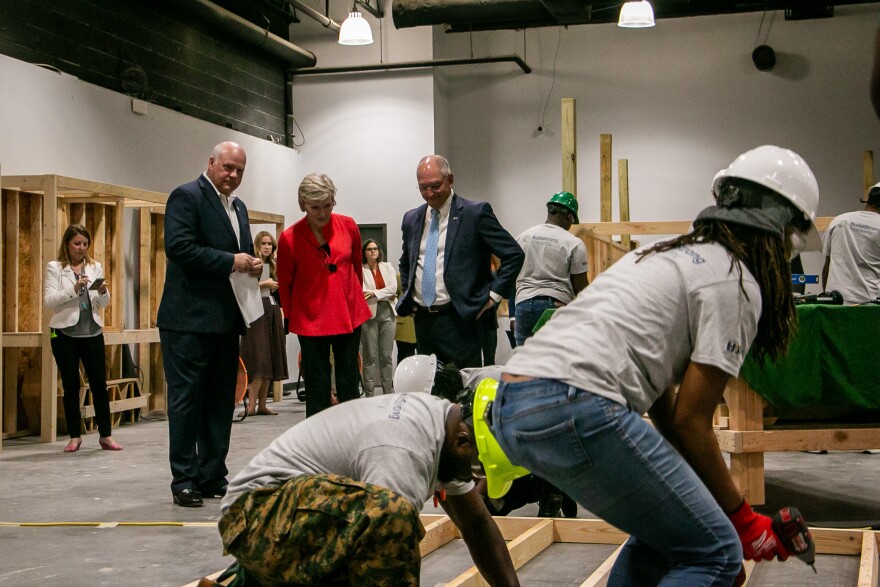After long-awaited updates to Louisiana’s building code, the Department of Energy announced Wednesday that the state will receive more than $1.6 million to implement them and build more energy-efficient houses that will be more equipped to survive hurricanes.
Nationwide, the federal agency awarded $90 million in grant money as part of the Biden administration’s campaign to modernize building codes across the country. As of March, two in three localities have yet to adopt updated building codes without weakening them.
Department of Energy Secretary Jennifer Granholm traveled to New Orleans to deliver the announcement herself after speaking to small business owners about the future of clean energy at an agency-led conference earlier that morning.
“Louisiana has shown unbelievable leadership in advancing next generation building codes. It doesn't happen everywhere. Sometimes there's a lot of backlog in state legislatures to get this to happen. We want this to be an example around the country,” said Department of Energy Secretary Jennifer Granholm during a visit to Kenner’s Buildstrong Academy on Wednesday.

Louisiana unanimously adopted the latest International Energy Efficiency Code during the 2022 legislative session after five years of discussions between the governor’s office, lawmakers and the construction industry. Before the update, the state built homes to the 2009 standard despite Louisiana law requiring updates every five years.
The move marked a major step forward as the state looks to cut its greenhouse gas emissions, reach carbon neutrality by 2050 and build communities more resilient to increasingly extreme weather fueled by human-caused climate change.
“We knew that if we want to get to net-zero by 2050 and meet our intermediate goals, the sooner we adopted these higher standards, the better,” Gov. John Bel Edwards said Wednesday. “But also, it doesn't just reduce the carbon footprint — which is incredibly important. It actually makes the homes more livable, more comfortable and saves money over the life of that home through lower energy bills.”
As a result of the new codes, some home-building costs could increase, but long-term the codes are expected to save the average Louisiana household $422 annually on their utility bills, according to Louisiana Public Service Commissioner Davante Lewis.

“Today represents a win-win when contractors can see a larger market, customers can save big on their bills, and we can relieve our power grid and decrease emissions here in the state of Louisiana,” Lewis said.
A year after voting to update the codes, state officials and homebuilder associations have transitioned to the 2021 international standards, and now they’re turning their eye to enforcement and building up the workforce, said Green Coast Enterprises CEO Jackie Dadakis, who served on the Louisiana Code Council.
Lewis said the updated code could lead to 6,100 new construction jobs in Louisiana. The $1.6 million grant will funnel through the Southeast Energy Efficiency Alliance, an Atlanta-based regional group that will partner with Louisiana organizations to ensure construction workers and companies understand and follow the new requirements.
“It's not enough for the policy to exist. We have to make sure that folks are educated, and they can become champions for the energy-efficiency aspects,” said SEEA’s senior program manager Maggie Kelley Riggins. “Every new building in the state of Louisiana will now be more energy-efficient.”
The group will also help create pathways to entering the field through apprenticeship and pre-apprenticeship programs and educational opportunities like those available at the Buildstrong Academy.
HousingNOLA director Andreanecia Morris has long advocated for the state to focus on improving energy-efficiency standards and upgrading existing homes to expand equitable and affordable housing in New Orleans. She said upgrading the standards is a first step that opens the state and city up to apply for even more money to improve older homes that often lack the insulation needed to keep energy bills manageable.
“This is the beginning of the miracle that the people of Louisiana need,” Morris said. “It is incumbent on our leaders to go after that money. Louisiana hasn't gotten its fair share of the Infrastructure Investment and Jobs Act money because we haven't gone after the money.”

While the new codes apply to new builds, renovations or rebuilds of existing structures can also fall under the code depending on how much of the house or building will be affected. The Department of Energy also plans to make grants available to upgrade and weatherize homes by the end of the year.
Morris emphasized that building to a higher standard will also help lower skyrocketing homeowner insurance costs amid the state’s latest insurance crisis as officials look to stop companies from fleeing the state. To Morris, legislators can build on the standard by putting more money into the new Fortify Louisiana program, which helps homeowners upgrade their roofs, and look to stabilize the state’s insurer of last resort, Louisiana Citizens.
“We can't continue to say that these are acts of God that we can't protect people against. That attitude is poisonous. We've gotta have the courage to do what's necessary,” Morris said.



